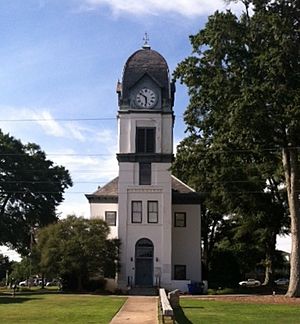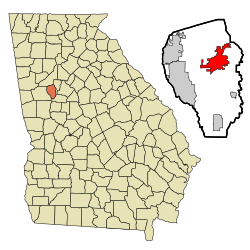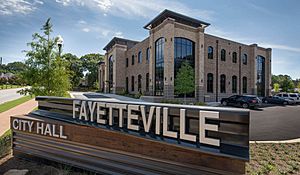Fayetteville, Georgia facts for kids
Quick facts for kids
Fayetteville, Georgia
|
|
|---|---|

Fayette County Courthouse
|
|
| Motto(s):
"No limits on imagination"
|
|

Location in Fayette County and the state of Georgia
|
|
| Country | United States |
| State | Georgia |
| County | Fayette |
| Established | March 28, 1822 |
| Incorporated (town) | 1823 |
| Incorporated (city) | 1888 |
| Government | |
| • Type | Council/Manager |
| Area | |
| • Total | 13.18 sq mi (34.14 km2) |
| • Land | 12.96 sq mi (33.58 km2) |
| • Water | 0.22 sq mi (0.56 km2) |
| Elevation | 1,030 ft (313.9 m) |
| Population
(2020)
|
|
| • Total | 18,957 |
| • Density | 1,462.28/sq mi (564.60/km2) |
| Time zone | UTC-5 (Eastern (EST)) |
| • Summer (DST) | UTC-4 (EDT) |
| ZIP codes |
30214-30215
|
| Area code(s) | 770 404, 678 |
| FIPS code | 13-28968 |
| GNIS feature ID | 0314089 |
Fayetteville is a city in and the county seat of Fayette County, Georgia, United States. As of the 2020 census, the city had a population of 18,957, up from 15,945 at the 2010 census. Fayetteville is located 22 miles (35 km) south of downtown Atlanta.
In 2015 the city elected its first African-American mayor, Edward Johnson, a retired US navy commander and pastor. In 2011 he was elected as the first black city council member. He was a three-term president of the NAACP.
Contents
History
Fayetteville was founded in 1822 as the seat of the newly formed Fayette County, organized by European Americans from territory ceded by force the Creek people under a treaty with the United States during the early period of Indian removal from the Southeast. Both city and county were named in honor of the Revolutionary War hero the French Marquis de Lafayette. Fayetteville was incorporated as a town in 1823 and as a city in 1909.
The area was developed for cotton plantations, with labor provided by enslaved African Americans, who for more than a century comprised the majority of the county's population. Fayetteville became the trading town for the agricultural area.
In the first half of the 20th century, as agriculture became more mechanized, many African-American workers left the area in the Great Migration to northern and midwestern industrial cities, which had more jobs and offered less oppressive social conditions.
A reverse migration has brought new residents to the South, and the city of Fayetteville has grown markedly since 2000, as has the county. The city's population has increased from 11,148 in 2000 to an estimated 16,990 in 2015.
Demographics
| Historical population | |||
|---|---|---|---|
| Census | Pop. | %± | |
| 1880 | 138 | — | |
| 1890 | 380 | 175.4% | |
| 1900 | 430 | 13.2% | |
| 1910 | 709 | 64.9% | |
| 1920 | 952 | 34.3% | |
| 1930 | 796 | −16.4% | |
| 1940 | 832 | 4.5% | |
| 1950 | 1,032 | 24.0% | |
| 1960 | 1,389 | 34.6% | |
| 1970 | 2,160 | 55.5% | |
| 1980 | 2,715 | 25.7% | |
| 1990 | 5,827 | 114.6% | |
| 2000 | 11,148 | 91.3% | |
| 2010 | 15,945 | 43.0% | |
| 2020 | 18,957 | 18.9% | |
| U.S. Decennial Census | |||
2020 census
| Race | Num. | Perc. |
|---|---|---|
| White (non-Hispanic) | 7,342 | 38.5% |
| Black or African American (non-Hispanic) | 8,481 | 44.06% |
| Native American | 52 | 0.15% |
| Asian | 1,154 | 6.06% |
| Pacific Islander | 6 | 0.01% |
| Other/mixed | 614 | 5.12% |
| Hispanic or Latino | 1,339 | 7.06% |
As of the 2020 United States census, there were 18,957 people, 6,833 households, and 4,833 families residing in the city.
2010 census
As of the 2010 census, there were 15,945 people, 6,006 households, and 4,264 families residing in the city. The racial makeup of the city was 55.0% White, 33.9% African American, 0.4% Native American, 6.6% Asian, 0.1% Pacific Islander, 1.3% from other races, and 2.8% from two or more races. Hispanic or Latino people of any race were 4.8% of the population.
Out of the 6,006 households, 39.7% had individuals under the age of 18. 51.8% of households were married couples living together, 16.0% had a female householder with no husband present, and 29.0% were non-families. 26.4% of all households were made up of individuals, and 12.0% had someone living alone who was 65 years of age or older. The average household size was 2.59, and the average family size was 3.14.
In the city, the age distribution was 26.7% under the age of 18, 7.4% from 18 to 24, 9.1% from 25 to 34, 15.4% from 35 to 44, 15.9% from 45 to 54, 11.4% from 55 to 64, and 14.0% who were 65 years of age or older. The median age was 39.9 years. The population was 54.4% female and 45.6% male.
As of the most recent community survey, the median income for a household in the city was $62,037 and the median income for a family was $81,613. About 6.5% of families and 8.9% of the population were below the poverty line, including 13.3% of those under age 18 and 6.1% of those age 65 or over.
Points of interest
The Fayette County Courthouse, built in 1825 four years after the county and town's founding, is the oldest surviving courthouse in Georgia. The courthouse is located in the center of the Fayetteville town square. Since the construction of a new courthouse, the 1825 building has been adapted for use as the local welcome center. It holds offices for Fayetteville Main Street and the Fayette County Development Authority.
The Holliday-Dorsey-Fife House was built in 1855 by John Stiles Holliday, uncle of the western gambler John Henry "Doc" Holliday. Operated as a house museum, it is open to the public, Tuesday - Saturday, as the Holliday Dorsey Fife Museum.
Pride Gardens was founded by gay advocate Niles Carl to commemorate those lost to AIDS in Georgia since 1980.
The Margaret Mitchell Library, built in 1948 and named in honor of the author, serves as the headquarters of the Fayette County Historical Society. Among its holdings are Civil War and genealogical records.
Fun Junction USA, formerly Dixieland Fun Park, established in 1990, is the third-largest amusement park in Georgia. It has received awards for its annual Halloween festival. In 2011, a lawsuit filed by an African-American employee prompted the NAACP to boycott the park after the owners were accused of racial profiling. In 2013, the owner John Williams was sued in court on charges of using racial epithets in reference to black go-kart operators.
Pinewood Atlanta Studios opened here in 2014; it is owned and operated by the noted Pinewood Studios of London, United Kingdom. It is the largest film and television production studio in the United States outside the state of California.
Education
The city is served by the Fayette County Board of Education.
In 2016, a soundstage at Pinewood Studios was open for educational use by the Georgia Film Academy. In late 2020, the Georgia Film Academy partnered with Trilith and the University of Georgia to launch its Master of Fine Arts film program; students would work and live in Trilith during their second year. Trilith also has a small K-12 school called the Forest School.
Georgia Military College has a campus in Fayetteville.
Notable people
- Andrew Adams, football player for Tampa Bay Buccaneers
- Paris Bennett, American Idol Season 5: fifth place finalist
- Chris Benoit, professional wrestler
- Nancy Benoit, professional wrestling manager
- Big Boi, rapper/actor
- Brandon Boykin, former NFL player for Philadelphia Eagles
- Millie Bobby Brown, actress, Stranger Things
- Zac Brown, Grammy Award-winning country music singer
- Kandi Burruss, former Xscape member
- Tonya Butler, football player
- Phil Cofer, basketball player for the Florida State Seminoles
- Matt Daniels, football player for St. Louis Rams
- John Deraney, football player for Detroit Lions
- Creflo Dollar, televangelist
- Hugh M. Dorsey, governor of Georgia
- Kyle Dugger, football player for New England Patriots
- Mike Duke, former CEO of Walmart
- Niko Goodrum, Major League Baseball player for the Detroit Tigers
- Mike Hilton, NFL defensive back
- Ufomba Kamalu, NFL defensive end for Houston Texans
- Emmanuel Lewis, actor, Webster
- Sam Martin, football player for Denver Broncos
- Christopher Massey, actor, musician, director, film producer
- Kyle Massey, actor, musician, Dancing with the Stars
- Caleb McLaughlin, actor, Stranger Things
- Ann Nesby, Grammy Award-winning singer and actress
- Kelley O'Hara, player for United States women's national soccer team and Utah Royals FC in the National Women's Soccer League; Olympic and World Cup champion
- Paul Orndorff, professional wrestler
- Tyler Perry, filmmaker, playwright, actor
- Plumb (born Tiffany Arbuckle Lee), songwriter, recording artist, performer and author
- Keshia Knight Pulliam, actress, The Cosby Show, Tyler Perry's House of Payne
- William Regal (born Darren Matthews), English professional wrestler
- Rick Ross, rapper
- Nellie Mae Rowe, folk artist
- Ferrol Sams, author
- Speech, leader of Arrested Development
- Anna Watson, "The World's Strongest Cheerleader"
- Gary Anthony Williams, actor and star of Special Agent Oso on Disney Channel
See also
 In Spanish: Fayetteville (Georgia) para niños
In Spanish: Fayetteville (Georgia) para niños


